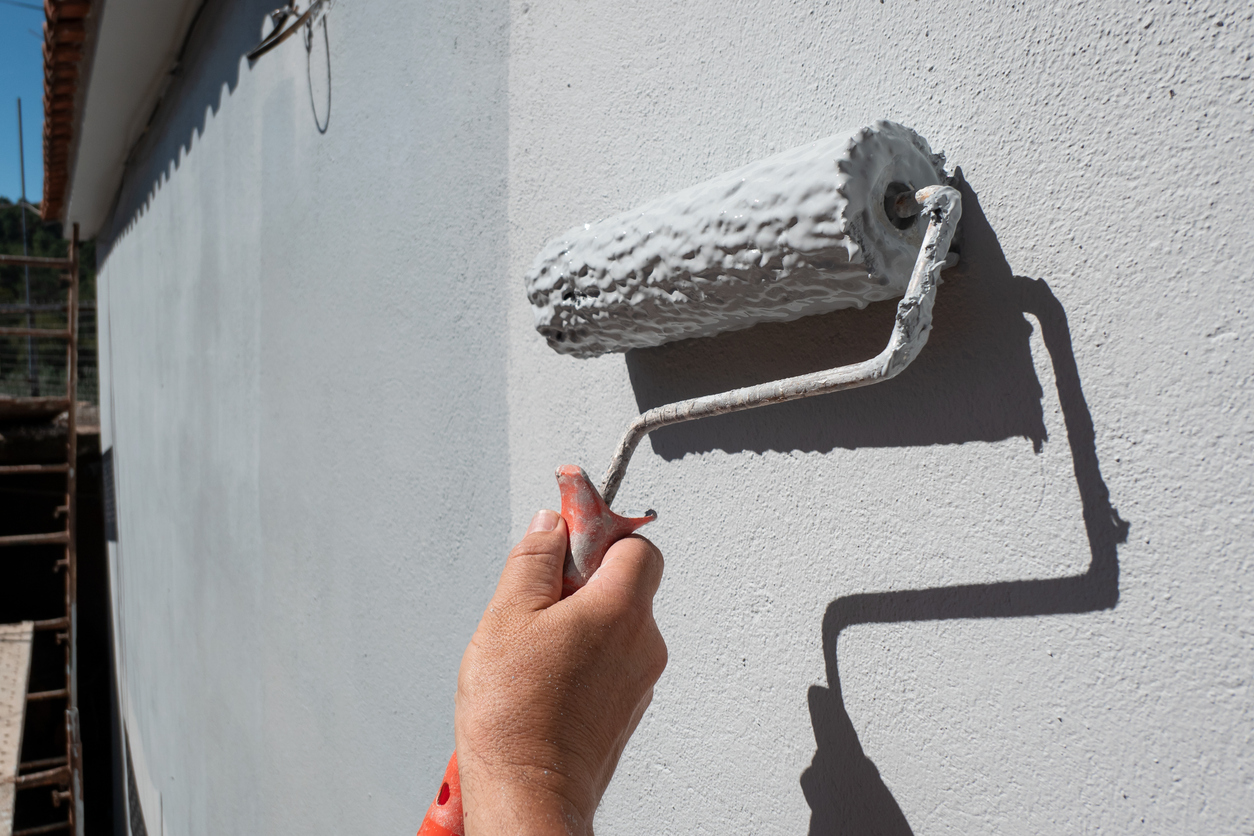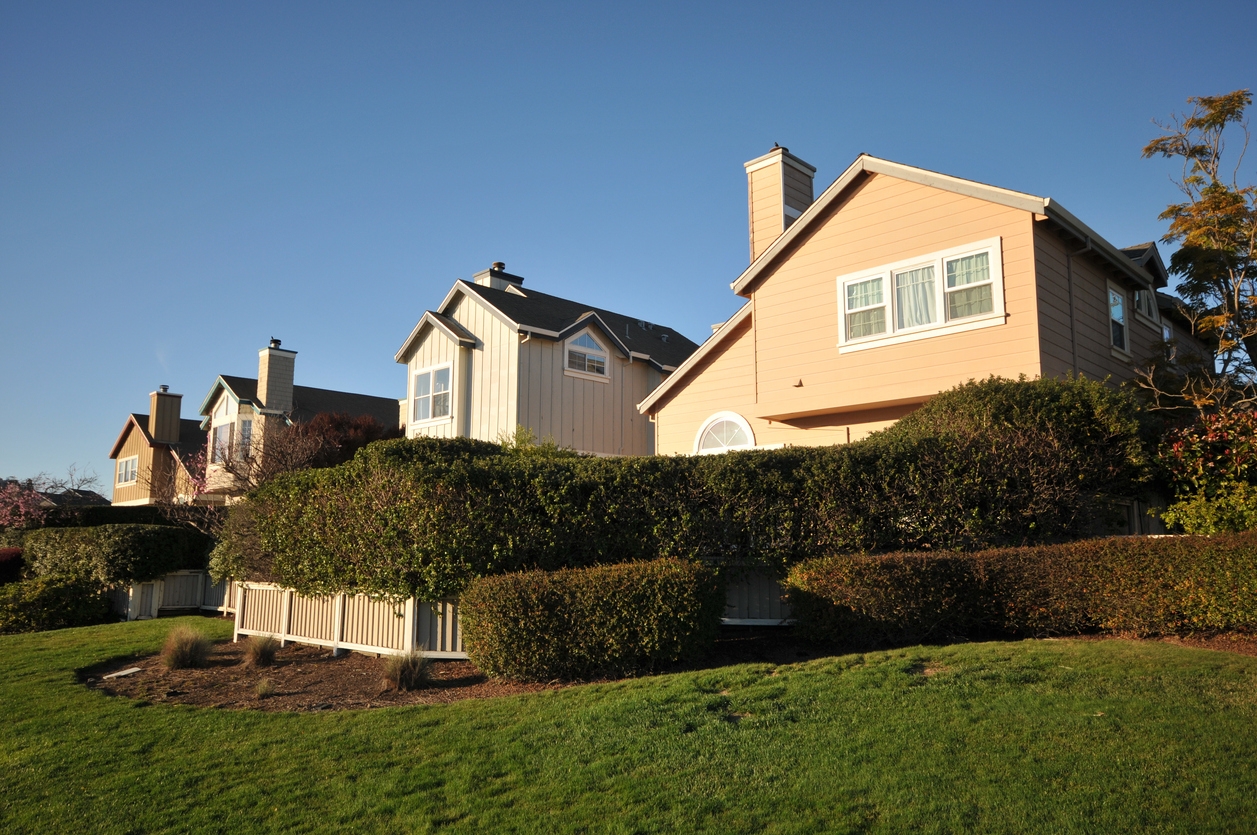A fresh coat of paint does more than merely look good. It protects your home and keeps it in top condition. Regular painting enhances curb appeal, shields your property from the elements, and helps maintain its value over time.
This blog will guide you through how often you should paint your house, considering material, climate, and wear and tear to ensure your home stays beautiful and well-protected. Trust our certified painters for high-quality workmanship and on-time delivery—contact us for a free residential painting services quote.
General guidelines for repainting
Exterior Painting
- Typical Recommendation: Repaint every 5-10 years, depending on climate, paint quality, and exposure.
- Climate Impact: Harsh sunlight, rain, or extreme temperature changes may require more frequent repainting.
- Maintenance: Regular inspections for peeling, cracking, or fading can help determine if repainting is needed sooner.
Interior Painting
- Common Timeline: Repaint every 3-7 years, depending on the room’s use and wear:
- High-traffic areas (e.g., hallways, kitchens): 3-5 years.
- Low-traffic areas (e.g., bedrooms, formal living rooms): 5-7 years.
- Indicators for Repainting: Stains, fading, or changes in aesthetic preferences.
Material-Specific Recommendations
- Wood: Typically requires repainting every 3-7 years due to its susceptibility to moisture and weather damage.
- Stucco: With high-quality paint, it can last 5-10 years, but cracks or fading may necessitate earlier maintenance.
- Brick: Painted brick can last 10-20 years, provided the surface is correctly prepped and maintained.
- Vinyl: This type of material requires repainting less frequently, often every 10+ years, as it holds paint well but may fade over time.
These timelines vary based on paint type, application quality, and environmental factors. Regular inspections and maintenance ensure longevity and aesthetic appeal.
Factors that influence how often you should paint
- Climate and Weather Conditions: Extreme heat, cold, or humidity can cause paint to deteriorate faster. Coastal environments with salt air and moisture can lead to peeling and corrosion, necessitating more frequent repainting.
- Sunlight Exposure: Prolonged UV exposure causes paint to fade, chalk, or peel over time, especially on walls that receive direct sunlight.
- Quality of Paint and Application: High-quality paints with UV protection and professional application techniques ensure better coverage, adhesion, and durability, reducing the frequency of repainting.
- Level of Maintenance: Regular cleaning, inspections, and timely touch-ups can address minor issues like dirt, mold, or chips, prolonging the paint’s lifespan.
- Personal Preferences: Aesthetic updates or following new color trends may prompt homeowners to repaint sooner than necessary for maintenance.
Signs it’s time to repaint your home
Repainting your home, whether interior or exterior, is not just about aesthetics; it also helps protect surfaces and maintain property value. Here are some common signs that indicate it’s time to refresh your paint:
Exterior Signs
Peeling or Cracking
- Peeling, cracking, or bubbling paint indicates a weather exposure or poor initial application. Left unchecked, it can lead to structural damage.
Fading
- UV rays cause colors to fade over time, especially on sun-exposed sides of the house. Faded paint not only looks dull but may also lose its protective qualities.
Chalky Residue
- A powdery substance on painted surfaces, often caused by weathering, means the paint is deteriorating and needs replacement.
Interior Signs
Scuff Marks and Wear
- High-traffic areas such as hallways, kitchens, and living rooms often show wear and tear, including scuff marks, dents, or scratches, making repainting necessary.
Fading
- Sunlight exposure through windows can cause interior walls to fade unevenly, detracting from the room’s appearance.
Paint Discoloration
- Discoloration, often caused by moisture or water damage, is a sign of underlying issues like leaks that should be addressed before repainting.
Damage to Surfaces
Mold or Mildew
- More than being unsightly, mold or mildew growth on walls poses a health hazard. A thorough cleaning and repainting with mold-resistant paint are essential.
Water Damage
- Stains or warping on walls and ceilings are signs of water damage. Repairing leaks and treating the surface before painting is crucial to avoid recurrence.
Cracks or Holes
- Damage to drywall or exterior surfaces can make repainting necessary to ensure a smooth, even finish.
Benefits of Timely Repainting
- Enhanced Protection: A fresh coat of paint helps seal and protect surfaces from environmental elements.
- Improved Aesthetics: Repainting revitalizes spaces and enhances curb appeal.
- Increased Value: Well-maintained paintwork positively reflects the property’s value and appeal.
Addressing these signs ensures your home remains beautiful and well-protected for years.
Benefits of regular repainting
Protective Shield
Regular painting acts as a barrier against the elements, protecting surfaces from weather damage, moisture infiltration, and pests. It helps prevent issues like rot, rust, and mold that compromise structural integrity.
Enhanced Curb Appeal
Fresh paint revitalizes the appearance of a home, keeping it modern and attractive. This factor is especially important for maintaining a welcoming and well-kept exterior.
Increased Property Value
A well-maintained paint job signals care and upkeep, significantly boosting a property’s resale value. Buyers are more likely to pay a premium for a home that looks move-in ready.
Cost Savings
By addressing wear and tear through regular painting, you can avoid more extensive and expensive repairs down the line, saving both time and money.
Why professional painting services make a difference
Expert Assessment
Professional painters assess your home’s unique requirements, including surface conditions, climate factors, and existing paint issues, ensuring the right materials and techniques are used. They can also recommend an appropriate repainting schedule for maintenance and longevity.
Quality and Longevity
Professional painters deliver a durable, flawless finish by using premium materials and proven application techniques. Their expertise minimizes common issues like peeling or uneven coverage, ensuring your investment lasts longer.
Efficient and Hassle-Free
Hiring professionals saves you the time and stress of managing a painting project yourself. They handle everything—from surface preparation and precise painting to thorough cleanup—allowing you to enjoy a beautifully painted space without the hassle.
Why choose Custom Painting, Inc. for your painting needs?
Experience and Expertise
With years of experience in residential painting, we excel in delivering flawless finishes tailored to your home’s specific needs. From walls and ceilings to cabinets and exteriors, our team uses advanced techniques and premium materials to ensure long-lasting results.
Customer Satisfaction
Our commitment to excellence is reflected in the glowing testimonials from satisfied clients and a portfolio of successful projects. Your vision is our priority, and we work closely with you to exceed expectations every time.
Contact us today for a free consultation, and let us help you keep your house looking its best!
Parting words
To keep your home looking its best, interior walls usually need painting every 3-5 years, depending on the room’s usage, while exterior paint lasts 5-10 years, influenced by climate and material. Maintaining a regular painting schedule enhances your home’s curb appeal and protects surfaces from wear, weather, and damage, preserving its value and longevity.
Ready to refresh the look of your home? Trust Custom Painting, Inc. for professional, long-lasting painting solutions. Call us at 925-294-8062 or fill out a Contact Form on our website.Serving the Bay area including the cities of Tracy, Union City, Vallejo and Walnut Creek.



